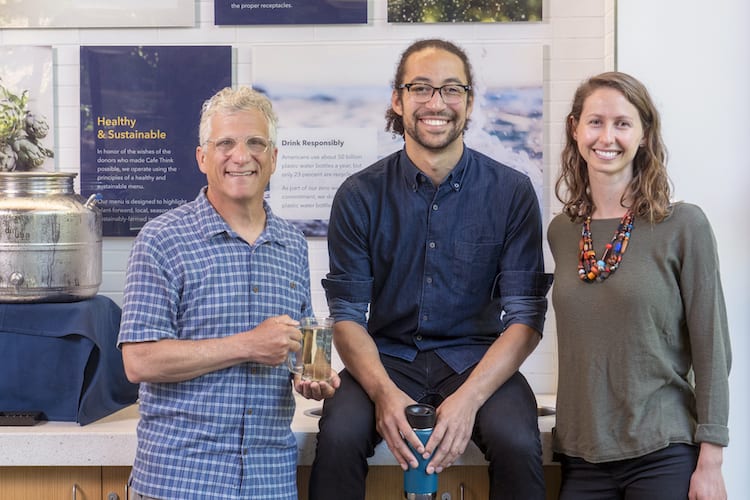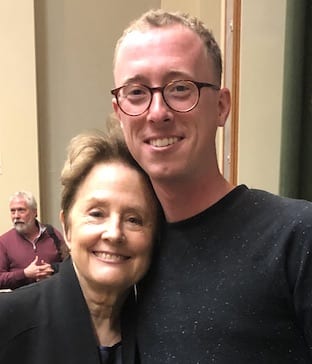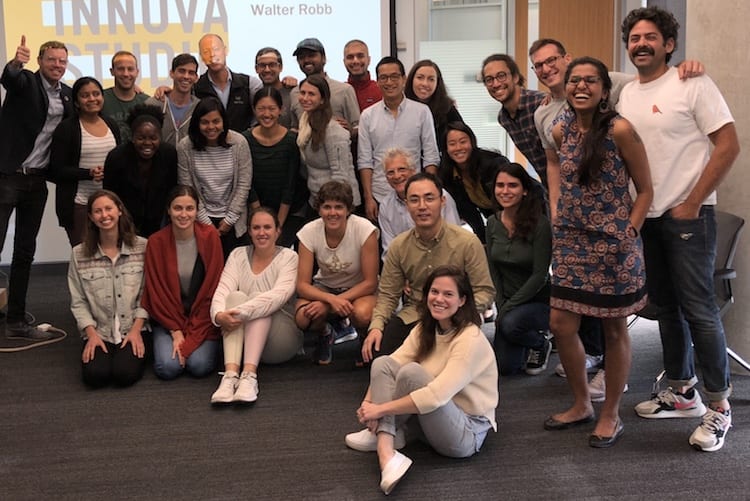
After working in the dairy industry in Illinois for six years, John Monaghan, MBA 20, arrived at Berkeley Haas on a mission to dive deeper into the business of food.
He didn’t waste any time. In his first year, Monaghan became co-president of the student-run Food@Haas, was nominated to the student advisory board for the Berkeley Haas Center for Responsible Business, and snagged a summer internship at Danone in New York, where he’ll be supporting marketing of the Oikos yogurt brand. He even shared lunch with Alice Waters at her restaurant Chez Panisse, after he worked as a graduate student reader during her Edible Education 101 course. “She hosted us as a thank-you for the semester,” he said.

Like many of the 20 full-time MBA students who have landed coveted internships and jobs this year in the food and beverage industry—at companies ranging from Clif Bar to Kraft— Monaghan is benefiting from the Sustainable Food Initiative at Haas. The umbrella effort, launched in April 2018 by the Center for Responsible Business, combines food-focused courses, cutting-edge research, entrepreneurship training, events with food industry luminaries, and key industry partnerships.
A food-focused tribe
The initiative both reflects and cultivates a growing interest in the food business at Haas and Berkeley. The number of students landing internships and full-time jobs in the food and beverage industry has doubled over the past three years, and the number of food-related startups—from 2019 MBA grad Somiran Gupta’s nearfarms, an online marketplace that connects small, local farmers directly with consumers, to Tannor’s Tea, founded by Samantha Tannor, MBA 20, whose company sells sugar-free matcha concentrate—is increasing every year.
“We’ve attracted a tribe of people who are food-focused,” says Doug Massa, a corporate relationship manager with the Berkeley Haas Career Management Group. “They want to learn about branding and marketing, but they also want to learn about opportunities in the food supply chain, business operations, and the role of venture capital in food.”
Connecting across Berkeley
Will Rosenzweig, faculty co-chair with the Berkeley Haas Center for Responsible Business (CRB) and a pioneer of the sustainable food movement at Berkeley, is leading the Sustainable Food Initiative. The founder of the Republic of Tea, Rosenzweig taught Haas’ first class on social entrepreneurship 20 years ago—and went on to mentor and invest in successful Haas startups including Revolution Foods, co-founded by Kristin Groos Richmond and Kirsten Saenz Tobey, both MBA 06, to make healthier cafeteria food for kids.
Working with CRB’s program manager Emily Pellisier, Rosenzweig is now figuring out how Haas expertise in entrepreneurship and business aligns with sustainability efforts across the Berkeley campus. They’re reaching out to innovative programs like the Berkeley Food Institute and the Alternative Meat Lab at the UC Berkeley Sutardja Center.
“With the riches we have at Berkeley, one of my jobs is to is to remove some of the boundaries between the disciplines, and Haas has been really supportive of that,” Rosenzweig said. “We’re getting other really smart people involved in solving these sustainability problems.”
Watch an “Edible Education 101” session with chef and cookbook author Samin Nosrat and community organizer Shakirah Simley, discussing diversity and inclusion in the food industry.
At the initiative’s core is “Edible Education 101,” which Rosenzweig teaches with Waters, who co-founded the class with author Michael Pollan in 2011. The undergraduate course brings scientists, CEOs, community activists, and chefs to Haas to talk about the future of food, from seeds to soil health to increasing access to quality food for all. Guests have included chef Samin Nosrat (of the popular Netflix docu-series based on her cookbook, Salt, Fat, Acid, Heat), who spoke last semester on diversity and inclusion in the food industry, to Danny Meyer, founder of Shake Shack and CEO of Union Square Hospitality Group, who addressed the future of restaurant careers.

Victoria Williams-Ononye, MBA 19, the graduate student instructor for the “Edible Education” course, said about 20 of her MBA peers attended the classes. “There’s a core group of people who come to Haas knowing they’re passionate about food,” said Williams-Ononye, who has accepted a job working in Breakthrough Innovation at Kraft in Chicago.
Monaghan called the caliber of “Edible Education” guest speakers “a hidden gem of this entire university.”
The sky’s the limit
Meanwhile, the Food Innovation Studio, Rosenzweig’s two-unit course which uses the Lean LaunchPad method to encourage students in food entrepreneurship, dives deeply into topics such as the rise of regenerative agriculture, sustainable alternatives to single-use packaging, the evolution of plant-based proteins, food system sustainability, and disruptive food delivery models.
While the majority of the students enrolled last semester were from the MBA program, the course draws students from across Berkeley, including Aaron Hall, a PhD student in the Materials Science & Engineering Program who is developing a richer-tasting plant-based fat substitute, and Jessica Heiges, a PhD candidate in Environmental Science, Policy, & Management, who co-founded RePeel, a reusable-food-container service for universities.
Beyond classes, the Sustainable Food Initiative serves as an umbrella for new research, including the recent case, “Reversing Climate Change Through Sustainable Food: Patagonia Provisions Attempts to Scale a ‘Big Wall’.” It’s also a home for partnerships with companies like Patagonia Provisions and General Mills’ Natural and Organics Operating Unit, which includes Annie’s Homegrown, EPIC, Cascadian Farm Organic, and Muir Glen brands. Both companies are now on the CRB advisory board, where they often find time to collaborate with each other, as well as Haas, said Robert Strand, executive director of the Center for Responsible Business.
“The sky’s the limit with this initiative,” Strand said. “We want to be a strong partner in the global conversation on food and bring the world to California and our ideas to the world.”